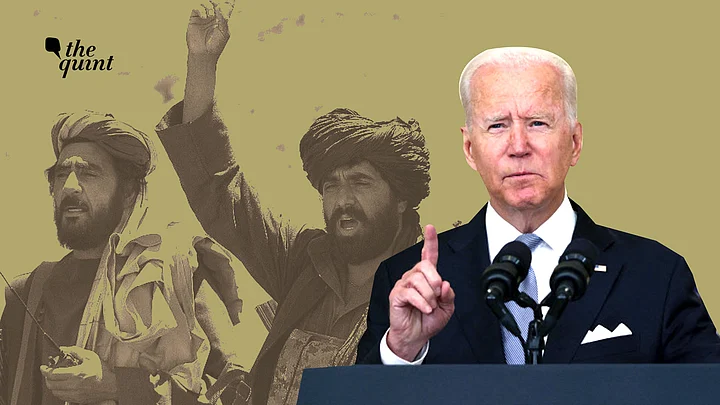In a revealing article for Just Security, an online forum for analysis of national and international security in the US, Central Intelligence Agency (CIA)'s former counter-terrorism chief for south and south-west Asia has asserted that the CIA had anticipated the lightning dissolution of the Afghan government as a possible scenario, and the US government was well aware of it.
Douglas London wrote in his piece, "While it’s certainly convenient to depict the shock and miscalculation US officials claim over Afghanistan’s tragic, rapid fall to the Taliban as an intelligence failure, the reality is far worse."
Underlining Joe Biden's remarks on the Taliban's astonishing seizure of power – he had stated that the collapse "did unfold more quickly than we [the US government] had anticipated" – London referred to them as "misleading at best".
In the CIA, London was responsible for preparing assessments on Afghanistan for the Donald Trump administration, and later, he consulted Biden’s counter-terrorism working panel on similar issues as a volunteer.
In 2019, he retired from his post.
Writing on what US intelligence had indicated prior to Trump's decision and Biden's ratification of the withdrawal under their banner of 'ending forever wars', he said:
"The US Intelligence Community assessed Afghanistan’s fortunes according to various scenarios and conditions and depending on the multiple policy alternatives from which the president could choose. So, was it 30 days from withdrawal to collapse? 60? 18 months? Actually, it was all of the above, the projections aligning with the various “what ifs.” Ultimately, it was assessed, Afghan forces might capitulate within days under the circumstances we witnessed, in projections highlighted to Trump officials and future Biden officials alike."Douglas London, for Just Security
The Decision to Exit and its Implications
During Trump's tenure, London wrote, the US exit was essentially set in stone by 2018.
However, despite intelligence warnings, the then Secretary of State Mike Pompeo spearheaded the US-Taliban engagement.
With the elections incoming, this had eventually culminated in "the catastrophic February 2020 withdrawal agreement," which had aimed to secure Taliban’s commitment to part ways with Al Qaeda and choose a peaceful resolution to the conflict. These objectives were "highly unlikely," intelligence had pointed then, London noted.
He further wrote:
"But it was just as clear in the Biden camp that the candidate was committed to leaving Afghanistan, the security implications from which his team had more confidence they could manage than the intelligence supported. Endorsing Trump’s withdrawal agreement was considered win-win. It played well with most Americans. Moreover, from my perspective, they appeared to believe that negative consequences would be at least largely owned by Trump, the GOP, and Khalilzad, whose being left in place, intentionally or not, allowed him to serve even more so as a fall guy."Douglas London, for Just Security
What More Did Intelligence Say
The former chief went on to say that policymakers were even warned about the Afghanistan's political and military leaders, who were profiting off US' presence in the region.
"(They) were likely to lose confidence and hedge their bets were U.S. military forces and intelligence personnel to withdraw. Further, that President Ashraf Ghani’s stubborn resistance to the Afghan political practice of buying support and his dismantling of the warlords’ private armies would weaken their incentives to support the government." London noted.
He added, "Policy makers were also aware of the Taliban’s effective use of a parallel “shadow government” structure maintained since losing power that provided for reliable lines of communication with local elders across the provinces, as well as government authorities, often owing to shared family or clan connections."
This meant that the militant organisation was in a position to negotiate and buy power. This was further exacerbated by the Taliban's robust propaganda machine, he said.
However, London also highlighted that intelligence is "an imprecise science with which to crystal ball given that the conditions upon which any assessment is made will likely change" and hence there were many possible scenarios for an "orderly withdrawal".
"As the CIA’s former regional counterterrorism chief, and then a private citizen, I advocated the need for the United States to remain in Afghanistan with a small, focused, counterterrorist presence but to adopt a dramatically different approach that did not require us being in the line of fire between rival national forces whose conflicts predated our intervention and will persist long after we’re gone."Douglas London, for Just Security
Concluding his article, London asserted that while the intelligence community has various grounds on which one can criticise it, and several ills in need of radical reform, "there was no intelligence failure by the agency in warning either Trump or Biden as to how events would play out."
He established, therefore, that the failure in Afghanistan was not due to a lack of warning but rather "hubris and political risk calculus of decision makers whose choices are too often made in their personal and political interest or with pre-committed policy choices."
(With inputs from Just Security)
